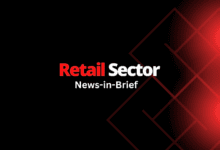Beyond the basket – driving new revenue streams with embedded finance
Andrew Ellis, CEO at NatWest Boxed, explains that in the face of ongoing margin pressure and a cost-of-living crisis, retailers are actively exploring new ways to deliver value to their customers and create new revenue streams.

Embedded finance is an attractive proposition that can complement retailers’ existing business, increase engagement and drive loyalty. As well as helping remove friction from the customer journey by offering credit options at the point of sale and streamlining the payment process, embedded finance can also help retailers foster longer-term relationships with customers through the creation of attractive offers that deliver real value for both parties.
Incentivising spend
Retailers can encourage an increase in direct spend through loyalty and reward programmes that enable consumers to create a ‘store of value’ that they can spend with a particular brand. An often-cited example is Starbucks. By offering double points for purchases made using a preloaded Starbucks Card, the brand incentivises customers to pay upfront for what they consume with the promise that they can unlock future rewards based on the points accumulated. As of October 2023, Starbucks held more than $1.5 billion in its stored value cards and loyalty programme globally, an amount higher than the total deposits held by many small banks.
While achieving such scale is exceptional, you don’t have to be a global coffee brand to deliver results in this area. Similar programmes that encourage consumers to create a ‘store of value’ can be set up by brands to help consumers cover ongoing expenditure, or to save towards high-value purchases. The objective is to reward customers for making regular payments – knowing that if the customer is saving with you, they are less likely to spend that money with your competition.
Customers who commit to spending a particular amount with a supermarket each month, for example, could be incentivised by the brand to earn free delivery and to benefit from discount vouchers as they draw down on the funds for their weekly shop. Holiday bookers could be offered the opportunity to use savings or payment plans that travel brands have embedded into their offerings to help spread the cost of a holiday over a longer period of time; and consumers wanting to save for Christmas, or expensive items such as furniture or electronics, could avail of similar embedded finance offerings from department stores and other retailers. Operating in this way, retailers can build ongoing relationships that customers truly value, encouraging more repeat spend rather than one-off purchases.
Banking economics
In a cost-of-living crisis and high-interest-rate environment, there’s also an opportunity for retailers to increase the attractiveness of their offer by giving consumers the ability to earn interest income on their balances. Using embedded finance through a licensed-banking provider can allow small balances to be significantly boosted over time, generating additional funds for the customer to spend with your brand.
Consumer loyalty is hard won. Customers want to know that they are valued and that you are offering them a good deal that will benefit them over the longer term. Savvy consumers may see little value in taking out a credit card with your brand, as they understand how you could potentially make money from them through the interest charged. Conversely, if your brand offers them a more sophisticated ‘store of value’ product that pays them a competitive rate of interest, this can go a long way towards building ongoing loyalty.
Authenticity
Retailers that understand their customers and embed financial products intelligently at the point of need within the customer journey, will be best positioned to succeed. At the most basic level, brands should minimise friction during the payments process – keeping the customer within their overall brand experience, without redirecting them to a third-party payment supplier that requires them to enter their payment details afresh.
Recent research conducted by BCG with 21 leading UK retailers discovered that embedded finance could aid a 4-7% uplift in revenues through incremental sales impact. Retailers commented on the importance of flexible payment options to drive conversion and basket sizes, resulting in higher order values, increased conversion rates and repeat purchases.
For brands that truly want to differentiate their offering, cultivating a strong relationship with customers and understanding the type of value-added services most likely to appeal is key. Perks such as free delivery or free installation can make consumers’ everyday lives easier and act as a competitive differentiator that helps a retailer stand out from the crowd in building more compelling experiences that keep customers engaged and drive revenue growth beyond the basket.
About Andy
Andy is the CEO at NatWest Boxed, a new Banking-as-a-Service business in the UK.
He was previously Head of Ventures at NatWest, where he led a portfolio of standalone digital businesses and products to generate new revenue streams across the bank. These included Mettle, the fast-growing small business banking app, a cash flow lender (Rapid Cash), a merchant acquiring business (Tyl) and a number of other banking and adjacent businesses.
Following an early career in technology and consulting with Accenture (formerly Andersen Consulting). As someone who believes in taking tangible action when it comes to improving diversity in banking, Andy launched the RBS Comeback programme for female returners and a digital apprenticeship programme to support social mobility.



